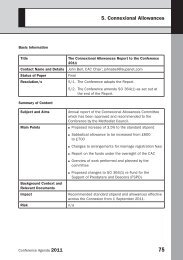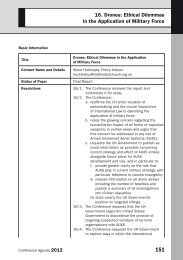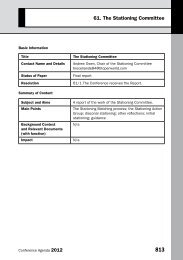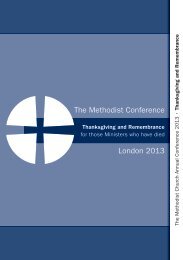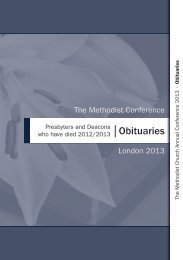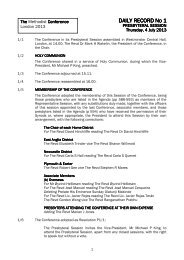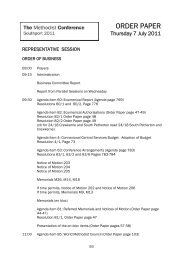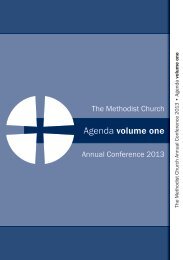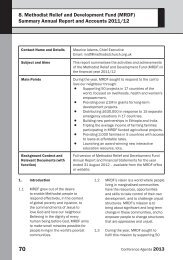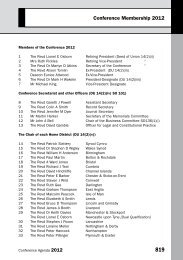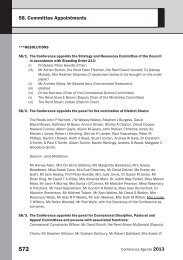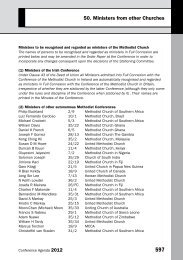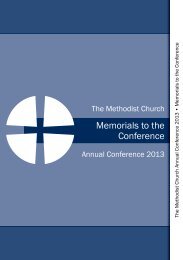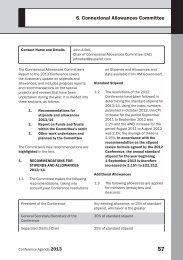Agenda Volume 3 - Methodist Conference
Agenda Volume 3 - Methodist Conference
Agenda Volume 3 - Methodist Conference
You also want an ePaper? Increase the reach of your titles
YUMPU automatically turns print PDFs into web optimized ePapers that Google loves.
57. The Fruitful Field Project<br />
for a greater proportion of formal<br />
learning activity to take place in local<br />
contexts. There will always be a place<br />
for institutions, colleges and centres<br />
configured as stable communities<br />
of faith and formation. However,<br />
qualitative evidence also suggests a<br />
growing desire within the <strong>Methodist</strong><br />
Church for the development of<br />
distributive learning programmes,<br />
where learning for lay and ordained<br />
people has, as its primary locus, the<br />
context in which ministry is being<br />
exercised and in which disciples are<br />
being formed.<br />
Local Preachers and Worship Leaders – a<br />
case study<br />
103 Patterns of resourcing and ministry<br />
across the Connexion are changing,<br />
and the support offered to emerging<br />
expressions of ministry must be<br />
effective and apposite. However,<br />
there is an equal need to provide<br />
support of the highest quality for<br />
established ministries within the life<br />
of the Church. Local Preachers and<br />
Worship Leaders make an immense<br />
contribution to the life of the<br />
Connexion. It is hard to overestimate<br />
the strategic importance of these<br />
ministries as a crucial public face<br />
of the <strong>Methodist</strong> Church, and as<br />
catalysts for the discipleship and<br />
mission of the whole people of<br />
God. This sub-section looks at the<br />
particular challenges of the Church’s<br />
existing arrangements for forming and<br />
training those called to preach and<br />
lead worship.<br />
104 The existing pathways for Local<br />
Preachers and Worship Leaders are<br />
outlined above in paragraphs 52-53.<br />
A proportion of people report a very<br />
positive experience of the current<br />
mainstream courses: Faith & Worship<br />
and the Worship Leaders Training<br />
Pack. However, there is widespread<br />
acknowledgement that existing<br />
pathways for forming and training<br />
Local Preachers and Worship Leaders<br />
need significant revision. This is<br />
seen in the number of Memorials to<br />
<strong>Conference</strong> addressing this area in<br />
recent years, as well as in the results<br />
of several consultation processes<br />
which have informed this section of<br />
the report.<br />
105 Some concerns focus on the<br />
accessibility of the pathways which<br />
are offered. This is particularly<br />
the case for pathways for forming<br />
and training Local Preachers.<br />
Although many people report that<br />
studying Faith & Worship was a good<br />
experience, at least a comparable<br />
number say that Faith & Worship has<br />
been a significant barrier or hurdle.<br />
105.1 Much of this may be to do with<br />
learning styles that do not match<br />
the way in which Faith & Worship<br />
is delivered and assessed. Some<br />
tutors manage to do excellent work<br />
in adapting delivery and supporting<br />
those on note and on trial in their<br />
care. However, there is evidence that<br />
considerable numbers of people<br />
who sense a call to preach find Faith<br />
& Worship an unrealistically timeconsuming<br />
process. It was originally<br />
<strong>Conference</strong> <strong>Agenda</strong> 2012 677



